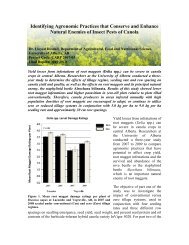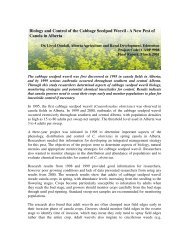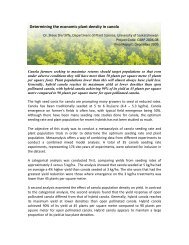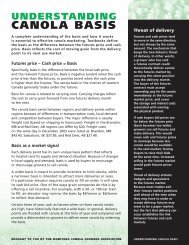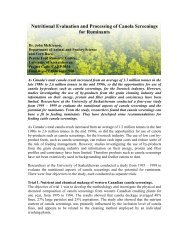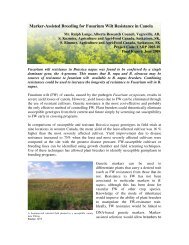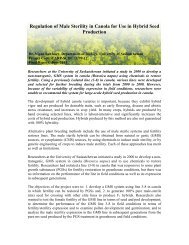Canola Digest, January 2013 - SaskCanola
Canola Digest, January 2013 - SaskCanola
Canola Digest, January 2013 - SaskCanola
Create successful ePaper yourself
Turn your PDF publications into a flip-book with our unique Google optimized e-Paper software.
HEALTHY LIVING<br />
SURVEYS SAY CANOLA<br />
OIL PERFECT FOR<br />
CANOLAINFO MARKETS<br />
By Brent Connett<br />
American, Mexican and Indian consumers are<br />
choosing healthier cooking oils and methods.<br />
45<br />
PHOTO: ©iStockphoto.com/ mitgirl<br />
onsumer surveys conducted<br />
this year in the United States, India and<br />
Mexico show that canola oil is in line with<br />
public trends toward healthier cooking<br />
oils and methods in these markets<br />
where <strong>Canola</strong>Info promotes canola oil.<br />
All surveys were commissioned by the<br />
<strong>Canola</strong> Council of Canada (CCC) to<br />
benchmark consumer awareness, use<br />
and perceptions of canola and other<br />
vegetable oils.<br />
The United States is the Canadian<br />
canola industry’s largest customer for<br />
oil and canola oil is the number two<br />
consumed oil there, as it is in Mexico.<br />
In India, canola oil is a new product,<br />
but its potential is huge given that this<br />
country is one of the largest edible oil<br />
markets in the world. India has high rates<br />
of heart disease and diabetes – just like<br />
the U.S. and Mexico – so its population<br />
could benefit from the low saturated<br />
fat in canola oil.<br />
UNITED STATES<br />
The U.S. survey, conducted by Cogent<br />
Research in March 2012, showed that<br />
consumers’ healthful perception of<br />
canola oil has increased significantly<br />
since the last Cogent survey in 2008.<br />
It now occupies a space closer to olive oil<br />
and is clearly differentiated from other<br />
types of cooking oils included in the poll<br />
that are perceived as less healthy, including<br />
vegetable, sunflower, peanut, sesame,<br />
coconut, soybean and grapeseed oils. The<br />
increase in canola oil’s healthy perception<br />
this year was considerably higher than<br />
for olive oil in the same period.<br />
“Across the entire sample polled,<br />
perceptions of cooking oils generally<br />
diminished compared to 2008, especially<br />
for vegetable, sunflower, peanut, sesame<br />
and soybean oils,” notes Shaunda<br />
Durance-Tod, <strong>Canola</strong>Info manager at<br />
the CCC. “Consumers are also now more<br />
likely to purchase a product made with<br />
canola oil versus one made with another<br />
type of cooking oil.”<br />
Cooking Oil Usage<br />
There has been a decrease in the number<br />
of Americans using cooking oil at large,<br />
from 85 percent in 2008 to 78 percent in<br />
2012. Those who have used cooking oil<br />
in the previous six months are typically<br />
using it about three times per week.<br />
<strong>Canola</strong> oil purchase and use is fairly<br />
equally distributed across geographic<br />
regions, including the Northeast, South,<br />
Midwest and West. It is most frequently<br />
used among consumers in the South<br />
and Midwest regions (by more than<br />
one-third). Northeasterners are reported<br />
to frequently use olive oil, and are the<br />
least likely to use canola oil.<br />
When consumers were asked how they<br />
use cooking oil, 84 percent said they use<br />
it for sautéing and 65 percent claimed to<br />
use it for pan-frying. Compared to 2008,<br />
there is a shift from deep- and panfrying<br />
to sautéing and salad dressings.<br />
“This shift in culinary preferences is a<br />
perfect match for canola oil’s versatility<br />
and heart-healthy qualities,” says<br />
Durance-Tod.<br />
There is also a change in the type of<br />
recipes Americans want to prepare. They<br />
are making more low-fat and low-calorie<br />
continued on page 46<br />
CANOLA DIGEST JANUARY <strong>2013</strong>



